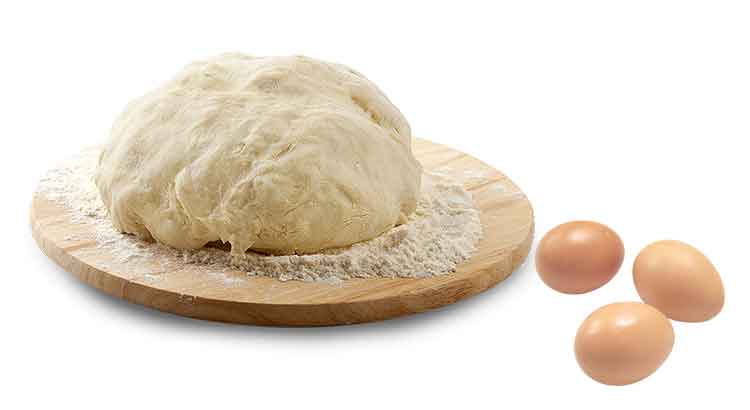Have you ever wondered if pizza dough contains eggs? Well, you’ve come to the right place to find out! In this article, we’ll explore the world of pizza dough and discover whether eggs are a common ingredient or not. Get ready to dive into the doughy details and learn about the different variations that make pizza such a versatile and beloved dish.
Pizza dough is the foundation of every mouthwatering slice, and it’s fascinating to uncover the ingredients that go into creating that perfect crust. We’ll start by exploring traditional pizza dough and its basic components. You’ll be surprised to find out that while some pizza dough recipes stick to the basics, others take a creative twist and add eggs or other ingredients for a unique touch.
So, whether you’re a pizza connoisseur or simply curious about the culinary world of pizza dough, join us on this journey as we unravel the mystery of whether pizza dough has eggs or not. Get ready to satisfy your pizza cravings while expanding your knowledge of this beloved dish. Let’s get started on our pizza adventure!
Traditional Pizza Dough Ingredients
When it comes to traditional pizza dough, the basic ingredients are pretty straightforward. You’ll need flour, water, yeast, salt, and sometimes a bit of olive oil. These simple ingredients work together to create a delicious and chewy dough that serves as the foundation for your favorite pizza toppings.
Flour is the main ingredient in pizza dough, providing structure and texture. Yeast is responsible for the dough’s rise, while water hydrates the ingredients and helps activate the yeast. Salt adds flavor and regulates the dough’s fermentation process. Olive oil, although not always included, can be added to enhance the dough’s elasticity and flavor.
It’s important to note that traditional pizza dough recipes typically do not call for eggs. Eggs are not a common ingredient in Italian-style pizza dough. However, it’s worth mentioning that there are various regional and modern variations that incorporate eggs or other ingredients for a different texture or flavor profile.
Pizza Dough Variations
While traditional pizza dough typically does not contain eggs, there are some variations that deviate from the norm. For example, in certain regions or specific recipes, eggs can be added to the dough to make it richer and denser. This is more common in sweet or dessert-style pizzas, where eggs contribute to a softer and cake-like texture.
In addition to eggs, other ingredients like milk, butter, or even cheese can be incorporated into pizza dough to create unique flavors and textures. These variations are often a matter of personal preference or regional culinary traditions. So, if you come across a pizza dough recipe that includes eggs, don’t be surprised – it’s just one of the many ways to experiment and create different styles of pizza.
Remember, there’s no one-size-fits-all approach when it comes to pizza dough. The beauty of homemade pizza is the ability to customize and adapt the dough to suit your taste and dietary preferences. Whether you prefer a classic, egg-free pizza dough or enjoy experimenting with different variations, the key is to have fun and savor the delicious end result.
Frozen Pizza
Frozen pizza has become a popular choice for quick and convenient meals. It offers a hassle-free way to enjoy pizza without the need for making dough from scratch. When it comes to frozen pizzas, the ingredients used in the dough may vary depending on the brand and type of pizza.
In many cases, frozen pizza dough does not contain eggs. The focus is often on creating a dough that is easy to work with and can withstand the freezing and baking process without compromising its texture. Frozen pizza dough typically consists of basic ingredients like flour, water, yeast, salt, and sometimes added fats or oils for better consistency and flavor.
One advantage of frozen pizza dough is its convenience. It saves you time and effort by eliminating the need to prepare dough yourself. However, it’s worth noting that the taste and texture of frozen pizza dough may differ from freshly made dough, as it undergoes different processes and has preservatives to prolong its shelf life. Nonetheless, frozen pizza remains a popular option for those looking for a quick and satisfying pizza fix.
What Eggs Do in Pizza Dough
While traditional pizza dough recipes usually do not include eggs, eggs can be used in certain variations to achieve specific characteristics in the dough. Eggs can add richness and tenderness to the dough, resulting in a softer and more cake-like texture. This is particularly common in dessert-style pizzas or recipes that aim for a sweeter and denser dough.
Eggs also contribute to the dough’s structure and stability. The proteins in eggs help bind the ingredients together, enhancing the dough’s elasticity and creating a more cohesive texture. Eggs can also enhance the browning of the crust during baking, giving the pizza a golden and appetizing appearance.
However, it’s important to note that eggs are not a necessary ingredient in pizza dough, and many traditional recipes omit them entirely. The decision to include eggs in pizza dough is often a matter of personal preference or the desired outcome of the final product. Whether you choose to use eggs or not, the key is to experiment and find the pizza dough recipe that suits your taste and culinary goals.
Overall, while eggs can play a role in certain variations of pizza dough, they are not a standard ingredient in traditional recipes. Whether you’re making pizza dough from scratch, enjoying a frozen pizza, or exploring different variations, the most important thing is to savor the delicious flavors and enjoy the experience of making or devouring a slice of pizza.
Alternatives to Eggs in Pizza Dough
If you’re looking to make pizza dough without eggs, there are several alternatives you can try. These alternatives can help you achieve a similar texture and structure in your dough while accommodating dietary preferences or allergies.
One common substitute for eggs in pizza dough is a flaxseed or chia seed “egg.” To make a flax or chia egg, simply mix one tablespoon of ground flaxseeds or chia seeds with three tablespoons of water. Allow the mixture to sit for a few minutes until it thickens and becomes gel-like. This mixture can be used as a binding agent in place of eggs, providing similar binding properties to help hold the dough together.
Another option is using applesauce as an egg replacement. Applesauce works well in dough recipes that don’t require the same level of structure as traditional yeast-based dough. It adds moisture and a hint of sweetness to the dough, while also helping to bind the ingredients together. Replace each egg with approximately ¼ cup of applesauce for best results.
Other alternatives to eggs in pizza dough include mashed bananas, yogurt, or buttermilk, depending on the desired flavor and texture. These substitutes can provide moisture and binding properties to the dough, resulting in a dough that holds its shape and bakes up nicely.
By exploring these alternatives, you can enjoy delicious homemade pizza dough without the need for eggs. Experiment with different options and find the substitute that suits your taste and dietary needs best, ensuring that everyone can enjoy a slice of pizza, regardless of their dietary restrictions.
Final Thoughts
Pizza dough is a versatile and delicious base for creating everyone’s favorite cheesy, saucy, and flavorful pizzas. While traditional pizza dough recipes typically do not include eggs, there are variations that incorporate eggs for a different texture or taste. Whether you choose to include eggs in your dough or opt for egg-free alternatives, the most important thing is to enjoy the process of making and devouring your homemade pizza.
Exploring different variations of pizza dough allows you to customize your pizza to suit your preferences and dietary needs. Whether you prefer a classic dough made with basic ingredients or you’re adventurous enough to try alternatives like gluten-free blends, yeast-free dough, or cauliflower crust, there’s a pizza dough option out there for everyone.
Remember, the joy of making pizza lies in the freedom to experiment, be creative, and have fun. Whether you’re hosting a pizza night with friends or simply satisfying your pizza cravings, let your taste buds guide you to the perfect combination of flavors and textures. So, grab your rolling pin, prepare your toppings, and get ready to indulge in a homemade pizza that will surely satisfy your hunger and delight your palate.

